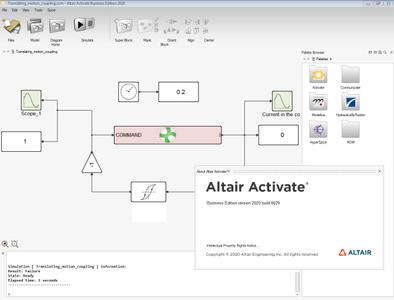
Altair Activate 2020.0 | 1.1 Gb
Altair announces most significant software update release in company history. Altair Activate 2020 - performs multi-physics system modeling with hardware-in-the-loop and Internet of Things (IoT) for digital twin development.
All of Altair's software products have been updated with advancements in user experience and countless new features, including intuitive workflows that empower users to streamline product development, allowing customers to get to market faster. The software update release expands on the number of solutions available for designers, engineers, data analysts, IT and HPC professionals, facility managers, and more to drive better decisions and accelerate the pace of innovation. It broadens the scope of the new user experience, enables access to more physics, data analytics, and machine learning, and makes the Altair software delivery method more flexible and accessible. New Features New Names for the Activate Editions: Business and Personal - The Professional Edition of Altair Activate was renamed: Business Edition of Altair Activate. - The Basic Edition of Altair Activate was renamed: Personal Edition of Altair Activate. Communicate Library - A new Communicate block library provides support for TCP/IP , UDP, Serial and MQTT communication protocols. HSTPYFIT Block - The new HSTPYFIT block implements fit (pyfit) solutions exported from Altair HyperStudy. Add Documentation When Exporting an FMU - When exporting a super block as an FMU, you can leverage the Model Report feature in Activate and optionally issue a command to generate an .html page with information about the super block and include it with the FMU. Read and Display FMU Documentation - The FMU Import block can access and display information about the FMU as an .html page (optional). New Tutorial: Explore Three Coupling Methods with Flux - Compare three coupling methods between Activate and Flux using co-simulation, lookup tables and FMUs . Signal Current Block - SignalCurrent block is added to the HyperSpice library (under HyperSpice>Analog>Interfaces). Enhancements FMU Export Support for Static-Linked Libraries FMUs exported from Activate 2020 are now linked statically to the required math library (MKL). Model Display The model display and navigation performance is improved in the Block Diagram Editor/Modeling Window. Events Reduced in Hydraulic Cylinder The friction model in the Hydraulics cylinder block has been reimplemented to reduce the number of events. Automatic Access to Parameters in the Block Dialogs After double-clicking a block, the block dialog opens with the focus on the first parameter of the block. Automatic Access in the Initialization and Context Editors After opening the Initialization and Context editors, you can enter text immediately without clicking in the text area first. FMU Block Attribute Display The FMU block Info dialog includes new attributes: DefaultExperiment, needsExecutionTool and generationDateAndTime. FMU Export When exporting an FMU, information about the solver parameters is included in the file modelDescription.xml. Speed Unit Added to Conversion Block The Unit Conversion block supports a new Speed unit: (mm/sec). Flux Co-Simulation Available with Linux Flux 2020 now supports co-simulation with Activate on Linux platforms. Non-Initialized Parameter Warning Issued The Modelica compiler now generates a warning for each non-initialized parameter. Support Added for VS2019 Compiler Support for the Microsoft VS 2019 compiler has been expanded to include Build Tools: Community and Professional editions. Repeat Block Available for Code Generation The Repeat Activation block is now supported for code generation in Activate. Collapse and Expand Palettes in Library Manager The Library Manger includes new buttons to expand or collapse the display of palettes in the tree. Resolved Issues - Error with discrete transfer function block for large input size. - Copying a super block can crash the application. - On Linux, Activate crashes when running a model using an FMU modelDescription.xml that is located in a /tmp directory that was created by root on Linux platforms.* - On Linux, interpolation methods are not available for the SignalIn block. - Issue with the undo operation after a copy-paste on a block is resolved. - FMU export of nested FMU doesn't pass compliance check. - RLTDIR warning message when starting Activate on Linux platforms. - When placing HyperSpice components next to a SpiceCustomBlock, the simulation cannot run. - Crash occurs when importing a nested FMU that has been exported with a non-zero Preferred Communcation Stepsize. - A crash can occur when an empty matrix is used as a limit for saturation in the integrator block. - Activate crashes when running a Flux co-simulation if the current working directory is read-only. - Model report selection frame sometimes shifts away from the block. - The Open File dialog for the FMU block does not offer the *.fmu file filter on Linux platforms. - Running a Flux co-simulation on Linux should not change the env variable ALTAIR_HOME. - The SpiceCustomBlock should allow block names to contain special characters. - Creating a Model Report can fail after generating the report twice. - Cannot change the text font size in Descriptions on Linux platforms. - Opening the Context Editor inside a super block should not act as a modification to the model. - Activate loses focus when closing the Find tool (from CCustomBlock). - The CurrentSensor block is not displaying results. - Modelica language syntax highlighting is not working in MoCustomBlock on Linux platforms. - Spice models not compiling correctly. - An FMU that is exported using the P-Project code generation, and is then imported, gives different results from original model. - The Modelica demo model LineForceWithTwoMasses.scm fails randomly. - Undo-redo operation with Hyperspice block results in a crash. - Mouse scroll is disabled when modifying parameters inside of the Modelica block parameters dialog. - Issue with the initialization of some parameters when working with Thermal/FluidHeatFlow Modelica models. - On Linux platforms, pausing a model during co-simulation with MotionSolve can crash the application. - Code generation with P-Project does not support matrix input with an integrator. - If a co-simulation with MotionSolve fails, Activate is non-responsive after the failure. - Code generation with P-Project for an FMU with the Power block doesn't pass a compliance check. - Code generation with P-Project for an FMU with a MatrixMultiplication block is failing with VS 2019 compiler. - When generating a Model Report, block images might be omitted due to long file names. - Running a Spice model with a Sparam block should not create a .rpa file next to the Activate model. - Screen capture for the Model Report can fail on Linux platforms. - Issue with the port position and label for the HyperSpice Sparam block has been fixed. - FMU import doesn't support safe mode in Linux. - In some cases, Activate crashes though the Modelica compiler errors are not detected and no warnings are issued. - In a model report, the double-click operation to open a super block is fixed. - The selection frame for the Model Report feature does not match the exact block position. - Issue with exporting an FMU from a Spice block. - Text is not displayed in the Curve Editor when the language is Japanese. - Pressing Enter when modifying text in the Property Editor should not move the cursor to the next property widget.  Altair Activate software is an open & flexible tool for rapidly modeling and simulating products as multi-disciplinary systems in the form of 1D models (expressed as signal-based or physical block diagrams), optionally coupled to 3D models. Leverage a flexible spectrum of simulations throughout your development cycle - ranging from early concept design (with models involving more abstraction and typically shorter simulations) to later detailed design (with less model abstraction & longer simulations).[/center]
Download now LINK
Altair Activate software is an open & flexible tool for rapidly modeling and simulating products as multi-disciplinary systems in the form of 1D models (expressed as signal-based or physical block diagrams), optionally coupled to 3D models. Leverage a flexible spectrum of simulations throughout your development cycle - ranging from early concept design (with models involving more abstraction and typically shorter simulations) to later detailed design (with less model abstraction & longer simulations).[/center]
Download now LINK